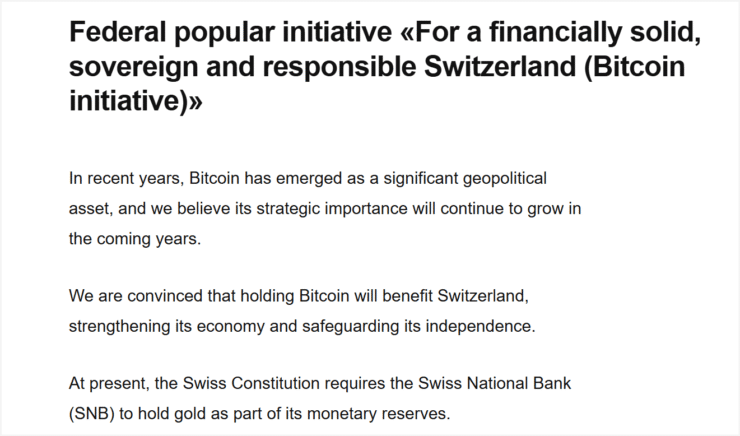The Swiss National Bank (SNB) has firmly rejected calls to add Bitcoin to its currency reserves, citing concerns over market stability and asset suitability. Speaking during the SNB’s General Assembly meeting on Friday, President Martin Schlegel emphasized that despite Bitcoin’s surface-level liquidity, cryptocurrencies often fail critical tests during periods of financial crisis.
“Cryptocurrencies are also known for their high volatility, which poses a risk to long-term value preservation. In short, one can say that cryptocurrencies, for the moment, do not fulfill the high requirements for our currency reserves,” Schlegel stated.
His remarks came in response to growing pressure from the Bitcoin Initiative, a Swiss advocacy group promoting Bitcoin’s inclusion in the country’s sovereign assets. The group argues that integrating Bitcoin into Switzerland’s treasury could enhance overall portfolio performance, offering attractive returns with manageable volatility compared to traditional assets.

While Bitcoin proponents highlight the asset’s potential as a strategic hedge, the SNB remains aligned with a conservative approach—prioritizing liquidity and stability over experimentation in its reserve management strategy.
Bitcoin Advocates Argue Swiss Reserve Strategy Could Have Doubled Gains
According to new analysis from the Bitcoin Initiative, Switzerland’s national reserves could have achieved dramatically stronger returns over the past decade had the SNB allocated even a small portion to Bitcoin. While the SNB’s traditional investments grew by about 10% since 2015, the group’s portfolio simulation suggests that a mere 1% allocation to Bitcoin would have nearly doubled overall returns—while only slightly increasing annualized volatility.
The Bitcoin Initiative stressed that Bitcoin’s volatility should not be judged in isolation but rather assessed by its overall impact on a portfolio’s risk-return profile.
“Bitcoin reached new highs, demonstrated resilience under market stress, and remains highly liquid, with daily trading volumes in the double-digit billions—even on bank holidays,” said Luzius Meisser, a member of the Bitcoin Initiative and board member of Bitcoin Suisse.
Meisser further noted that major powers, including the United States, have reportedly begun strategic Bitcoin accumulation—suggesting that modern reserve strategies could increasingly involve digital assets.
Despite these arguments, the SNB continues to resist Bitcoin adoption, citing liquidity and volatility concerns—keeping the debate over Bitcoin’s role in national reserves alive in a rapidly evolving financial landscape.
ECB and Swiss Authorities Hold Firm Against Bitcoin Reserves
While Switzerland grapples with internal calls to add Bitcoin to its reserves, broader European sentiment remains skeptical. European Central Bank (ECB) President Christine Lagarde has repeatedly criticized Bitcoin, labeling it “worth nothing” and a “highly speculative asset” often associated with money laundering.
Earlier this year, Lagarde reaffirmed her stance following comments from Czech National Bank Governor Ales Michl, who suggested his institution was considering Bitcoin as a reserve asset. Lagarde countered that Bitcoin fails to meet the ECB’s standards for liquidity, security, and safeguards against criminal misuse.
Other European central banks have echoed similar resistance. In February, Poland’s central bank categorically ruled out holding Bitcoin reserves “under any circumstances,” while Romania’s central bank issued warnings against banks lending to crypto firms.
Interestingly, despite rejecting direct Bitcoin holdings, the SNB has indirect exposure through equity investments. According to Fintel data, the SNB holds shares in companies with substantial Bitcoin treasuries, including 520,000 shares of Strategy (formerly MicroStrategy), 8.12 million shares of Tesla, 580,000 shares of MARA Holdings, and 500,000 shares of CleanSpark as of the end of 2024.
While direct adoption remains off the table, Bitcoin’s influence through corporate channels suggests a more nuanced, gradual integration into global financial systems.
Quick Facts
- The Swiss National Bank has rejected calls to add Bitcoin to its currency reserves, citing liquidity and volatility concerns.
- The “Bitcoin Initiative” seeks to amend the Swiss constitution to require the SNB to hold Bitcoin alongside gold.
- The initiative must collect 100,000 signatures within 18 months to trigger a national referendum.
- Switzerland’s position mirrors broader skepticism across Europe regarding the inclusion of cryptocurrencies in central bank reserves.





